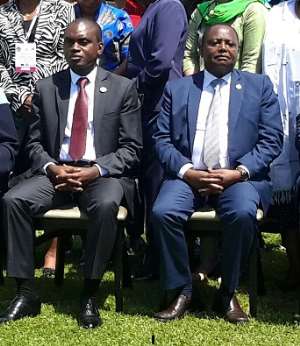
Accra, Nov. 26, The Republic of The Gambia has deposited at the African Court on Human and Peoples Rights the declaration required under Article 34(6) of the Protocol to allow Non-governmental Organisations and individuals to access the Continental Court directly.
The notice of deposition was signed by President Adama Barrow on October 23, 2018; which makes the country the ninth to allow NGOs and individuals to access the African Court directly.
The Gambia had ratified the Protocol establishing the African Court in June 1999, Justice Sylvain Ore, the African Court President stated stressing that; “by depositing the declaration, The Gambia is reaffirming its seriousness in upholding human rights of its citizens”.
The African Court President urged other countries to follow The Gambia’s footsteps.
Other countries which had already deposited the declaration are: Ghana, Benin, Burkina Faso, Côte d’Ivoire, Malawi, Mali, Tanzania and Tunisia.
“For the African Court to achieve its objectives and further strengthen African human-rights systems, a greater number of countries must ratify the protocol and make the declaration under Article 34(6),” stated Justice Oré.
The African Court was established by virtue of Article one of the Protocol to the African Charter on Human and Peoples' Rights on the Establishment of an African Court on Human and Peoples' Rights.
Justice Ore said the Continental Court was to complement the protective mandate of the African Commission on Human and Peoples’ Rights, with a view to enhancing the protection of human rights on the continent.
He said since the adoption of the Protocol in June 1998, 30 of the 55 African Union (AU) Member States have ratified it and only nine State Parties to the Protocol have made the declaration under Article 34(6).
The African Court President said the success of the Court as a human rights protection mechanism requires much wider ratification of the Protocol by Member States, as well as their acceptance of the competence of the Court by making the declaration under Article 34(6).
He said “the universal ratification would give the Court the legitimacy it needs to effectively discharge its mandate”.
The African Court is composed of eleven Judges, nationals of Member States of the African Union elected in their individual capacity.
The African Court meets four times a year in Ordinary Sessions and may hold Extra-Ordinary Sessions.




 Former Kotoko Player George Asare elected SRC President at PUG Law Faculty
Former Kotoko Player George Asare elected SRC President at PUG Law Faculty
 2024 elections: Consider ‘dumsor’ when casting your votes; NPP deserves less — P...
2024 elections: Consider ‘dumsor’ when casting your votes; NPP deserves less — P...
 You have no grounds to call Mahama incompetent; you’ve failed — Prof. Marfo blas...
You have no grounds to call Mahama incompetent; you’ve failed — Prof. Marfo blas...
 2024 elections: NPP creates better policies for people like us; we’ll vote for B...
2024 elections: NPP creates better policies for people like us; we’ll vote for B...
 Don’t exchange your life for wealth; a sparkle of fire can be your end — Gender ...
Don’t exchange your life for wealth; a sparkle of fire can be your end — Gender ...
 Ghana’s newly installed Poland train reportedly involved in accident while on a ...
Ghana’s newly installed Poland train reportedly involved in accident while on a ...
 Chieftaincy disputes: Government imposes 4pm to 7am curfew on Sampa township
Chieftaincy disputes: Government imposes 4pm to 7am curfew on Sampa township
 Franklin Cudjoe fumes at unaccountable wasteful executive living large at the ex...
Franklin Cudjoe fumes at unaccountable wasteful executive living large at the ex...
 I'll 'stoop too low' for votes; I'm never moved by your propaganda — Oquaye Jnr ...
I'll 'stoop too low' for votes; I'm never moved by your propaganda — Oquaye Jnr ...
 Kumasi Thermal Plant commissioning: I pray God opens the eyes of leaders who don...
Kumasi Thermal Plant commissioning: I pray God opens the eyes of leaders who don...
